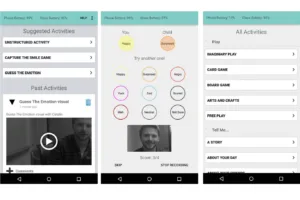Superpower Glass, a new study by Stanford University’s School of Medicine, has explored the potential for augmented reality wearables to help individuals with autism develop social skills during their formative early years.
14 children with autism were provided with Google Glass technology to use at home. Paired with facial recognition software, the device was used to help the children decipher facial expressions and communicate with others.
Image: Stanford University
Designed like a video game, the software tasked participants with correctly identifying emotions and rewarded them for making eye contact. 12 of the 14 families involved in the trial said that the children found it easier to maintain eye contact after taking part in the study.
Research into Superpower Glass is continuing, with a view to making the technology more widely available in the future.

